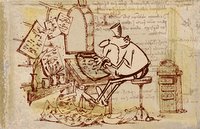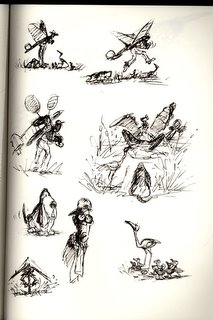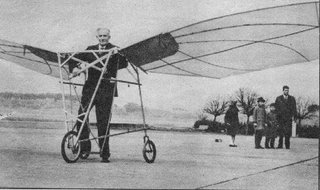Making a short -part 3- exploration
 Studies for a Virgin and Child and Machines (detail), c.1478-1480 pen and ink over metelpoint on a reddish prepared surface; London,British Museum
Studies for a Virgin and Child and Machines (detail), c.1478-1480 pen and ink over metelpoint on a reddish prepared surface; London,British Museuma wonderful scribbly Leonardo
I want to talk more about research or as I like to call it exploration (at least since I started writing this post). Research sounds so dry and academic, boring really. Exploration sounds like you are expecting great discoveries and are willing to embark on the unknown. It's exciting. Research (Exploration) is often over looked and very often given short shrift. Everyone is always trying to get on with it. They want to start animation or writing the script or filming. Exploration encompasses more then just research as well. In Sandy Mackendrick's class notes (found in the book On Film-making) He mentions four steps in A Technique for Having Ideas that together are a good start to "Exploration."
They are:
1. Collecting Data
2. Organizing the Data
3. Incubating the Material
4. Preserving the Spark
Not to get into too much detail here (since I again recommend that you buy the book if you are interested in film) but 1) Collecting Data is research, acquiring as much information around your subject that you can. Most importantly keeping an open mind to the material. 2) Organizing the Data is making sense of the material and assimilating it, being more critical and analyzing the material. These first two steps are equivalent to life experience. So that someone can tell a story about something they've never experienced first hand: Leonardo trying to fly, for example. 3) Incubating, is sleeping on it. Putting the previous two steps aside to let your sub-conscience work on it. If you are too impatient to come up with an idea you usually won't find it, the great white void. 4) Preserving the spark, this comes from practice, but is the ability to take the above involuntary ignition of the idea and apply effort and discipline to establish a level of productivity to bring your work to life. Sandy warns of two mistakes that are made here. They are, impatience - "the proficient hack seizes too soon on an idea that expertly renders immature and superficial ideas" and inexperience - "the inspired amateur has a brilliant concept that dies through incompetence of expression".
Once I had the idea of animating Leonardo da Vinci I began to read everything I could about him and instead of being intimidated by the great artist I began to see the artist I see in myself and so many of my peers. He kept a sketchbook. He would struggle over his drawings trying to get that right pose. He procrastinated. He worked on things to pay the rent. He had many interests and sometimes had trouble focusing on one thing. He wrote backwards with his left hand...well maybe he was a little different. He was eccentric in his time. Today I think he would be an animator or at least would have dabbled in it. It was through exploration that I discovered a richer foundation for my idea or rather my vague notion of Leonardo with a flying contraption. Exploration gave me ideas for a story line and business to play and a character. Not that I put in everything I read about da Vinci. I kind of just absorbed it and the knowledge just crept in there. I Organized the Data by distilling down the reading into drawings, a lot of drawings. I needed to not only figure out the story to tell but how Leo would look. What his world would look like? What other characters would play a role? Michelangelo perhaps (they were rivals)? How would Leo move? How many ways can he hit the ground? Again, not everything would make it and nothing is ever precious. I just allow myself to have fun and enjoy the journey. I leave you one more warning from the old man -
"When that energy runs low, there is the danger of technique taking over and the creator settling for the easier cliche in order to avoid the difficulties a work of true originality entails."
Early exploration - a few of the ideas from these pages made it into the film and a few didn't.
















